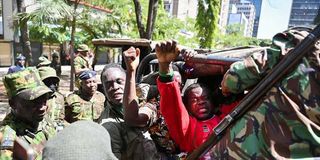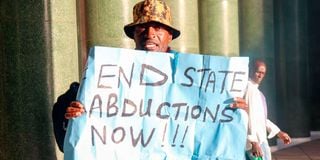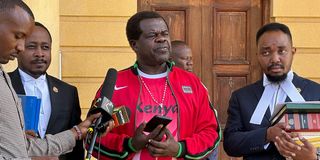Premium
Fury over abductions as Kenyans take to the streets

Busia Senator Okiya Omtatah reacts after riot police officers detained him among other protesters demonstrating against what they say is a wave of unexplained abductions of government critics, along the Aga Khan walk in downtown Nairobi, Kenya December 30, 2024.
What you need to know:
- Street protests rocked parts of the capital Nairobi, Embu, Karatina town and Mombasa City, with police, who are suspected to be behind the abductions, responding with brute force— tear gas and arrests— leaving some protesters injured.
Scores of Kenyans Monday took to the streets and online platforms, to express their displeasure with the recent wave of abductions and enforced disappearances targeting individuals perceived as critics of President William Ruto’s administration and its policies.
Street protests rocked parts of the capital Nairobi, Embu, Karatina town and Mombasa City, with police, who are suspected to be behind the abductions, responding with brute force— tear gas and arrests— leaving some protesters injured.
The protesters wielded placards of some of the latest victims of alleged police abductions and enforced disappearances, including Gideon Kibet, Ronny Kiplagat, Steve Kavingo Mbisi, Billy Mwangi, Peter Muteti, Bernard Kavuli and Kelvin Muthoni.
Online, an army of activists and ordinary Kenyans mobilised in support of the street demos, amplified anti-abduction messages as they posted highlights of the protests and even attempted to expose rogue police officers.

Activist Julius Kamau holds a placard reading “End State Abductions Now” on Kimathi Street in Nairobi on December 28, 2024.
At least 20 protesters— including a sitting senator, a former presidential aspirant and scores of human rights defenders— were arrested and taken to various police stations in Nairobi, Mombasa and Eldoret.
They are Busia Senator Okiya Omtatah, former presidential aspirant Reuben Kigame, and activists Hussein Khalid, Lydia Adhiambo, Lilian Muthike, Mathias Shipeta and Royal Khamisi.
In the capital Nairobi, which had experienced relative calm in the morning, police fired tear gas to break up demos on Aga Khan Walk, and at the Moi Avenue and Kenyatta Avenue junction.
At first, the officers attempted dialogue, asking the protesters to disperse and leave. They were unsuccessful as agitated Kenyans joined the demonstrations at the Aga Khan Walk, with numbers swelling to approximately 200 at the height of the protest.
The protesters had planned to march to the Government Square, which houses the Office of the President, the Deputy President’s, National Police Service Headquarters, before marching on to Parliament.
Aware of this motive, the police secured strategic roads using officers, vehicles and cavalry at the junctions of City Hall Way and Parliament Road, as well as Harambee Avenue and Taifa Road, thus blocking anyone from reaching the crucial government buildings.
Not able to proceed to their desired destination, the protesters camped at Aga Khan Walk where the most vocal of the lot, led by Mr Omtatah, linked themselves with a chain and held firm despite multiple teargas canisters being lobbed directly at them. With each round of teargas, a few protesters were dislodged, running away from the core group. At least two men collapsed and were taken aside for medical attention.

Senator Okiya Omutatah (centre) at the High Court in Nairobi on December 30, 2024.
In the distance, tear gas canisters could be heard exploding, preventing those who had run away from regrouping with their counterparts.
Slowly, the officers narrowed in on the roughly 20 protesters who remained steadfastly holding on to the chain.
One by one, the officers dragged protesters to waiting police vehicles. Some resisted being shoved in the back with chants of “Aluta Continua” (The struggle continues) as others shouted their names.
Ms Carolyne Njiru, an activist who was part of the protesters, demanded that the Inspector-General (IG) of Police Douglas Kanja orders an investigation into the abductions.

A police officers attempts to calm down protestors during the anti-abductions demonstrations held on December 30, 2024.
“We have had the IG saying that he does not know those who are abducting these people and where they have been taken. We demand that he orders an investigation into the abductions so that those who are abducting these people can be arrested and taken to court,” Ms Njiru told Nation.
Human rights defender Fredrick Odhiambo also demanded that the police officers be mandated to produce those who are missing.

Police officers at Uhuru Gardens in Mombasa County where youths planned to hold anti-abduction protest on December 30, 2024.
“These are our children and the main question is where they have been taken. Why are people being abducted every now and then in this country for criticising the government? We demand an end to the abductions and adherence to the rule of law,” he said.
Many Kenyans remain unaccounted for after previous demonstrations throughout the year. Currently, the Kenya National Commission on Human Rights records show that 82 abduction cases have been recorded since June, with 29 people still missing. Seven of these cases have been reported in the last two weeks alone.
In June this year, anti-government protests, majorly coordinated by the youth, erupted in response to proposed tax hikes in the Finance Bill 2024, resulting in the death of at least 61 persons as reported by a consortium of several human rights organisations including Amnesty International.
Yesterday, Makueni Senator Daniel Maanzo had a rough time as he attempted to offer legal counsel to Mr Omtatah and other protesters arrested in Nairobi.
When he arrived at the Central Police Station seeking to speak to Mr Omtatah, police refused to give him the names of those in custody informing him to wait until they are arraigned.

A protestors offers some red roses to police officers during the anti-abductions demonstrations held on December 30, 2024.
“I intend to appear for them so that we can seek bonds from courts. I want to say this does not benefit the country at all…I think the government is making a very big mistake. The abductions are extrajudicial activities against Kenyans, it will not help the government of the day at all,” he said.
Similar drama was witnessed in Embu town, where chaos broke out as police battled to stop protesters. Human rights defenders took to the streets to protest against the abduction of a college student, Billy Munyiri Mwangi.
A crowd of protesters had gathered at the town's CBD ready to demonstrate when heavily armed security officers confronted them.
The officers charged at the protesters and fired teargas canisters at the crowd. However, the protesters responded by throwing stones to the officers. Tension mounted as the officers and protesters engaged in a rock-and-gas exchange for hours. Eventually, the protesters were overpowered and repulsed.
Later the protesters regrouped, accusing the police of firing teargas canisters without any provocation.
They barricaded the streets using tyres, vowing that no amount of intimidation would deter them from demonstrating over rise in abductions of government critics.
Mr Mwangi, who stays in Nairobi, was at home for holidays when the worst happened. On December 21, the 24-year-old student was at a barber's shop in Embu town waiting to be shaved, when a white double -cabin pick up pulled up.
Four hooded men, suspected to be government security agents, alighted, grabbed the unsuspecting Mwangi and dragged him towards the car, to the astonishment of onlookers. When he demanded to know why he was being arrested, the men reportedly replied; "you will know later", bundled him into the vehicle, and sped off at high speed.
According to the family, they cannot understand why he was abducted and currently being held incommunicado.
His mother Regina Wairimu said she was at home when she received information from the barber that her son had been seized and whisked off to unknown place.
“We are still in shock following what happened to our son...I want my son back home alive. And if he has done anything wrong I’m ready to apologise on his behalf,” said Ms Wairimu as she sobbed.
Gerald Karicha, the father, said he is still in agony: “I’m in pain and shock following the abduction of my son.”
“I campaigned for this government and it was elected. Therefore, if it is the government holding my son, then it should release him,” he said.
In Karatina, business was disrupted as police battled a group of demonstrations who lit bonfires and hurled stones at the officers.
The town that was the epicentre of Gen Z protests in June and July was relatively calm in the morning but a group of rowdy youths started lighting bonfires at around 2pm.
Anti-riot police moved and started lobbing teargas to disperse them as they attempted to barricade the busy Karatina Nairobi highway.
In Mombasa, police dispersed youths who had gathered for the protests at Uhuru Gardens, with County Commander Peter Kimani declaring the demos illegal.
“Is there an abduction in Mombasa? SO why are you demonstrating here? ..You should go demonstrate in Nairobi,” he said.
Despite the organisers arguing that Uhuru Gardens was a public space where everyone had the right to gather, the commander ordered his officers, who had outnumbered the protesters, to push the youth out of the venue.
Moments later, the protesters regrouped returned to the streets before police confronted them again, arresting Mr Khalid, Ms Adhiambo, Ms Muthike, Mr Shipeta,and Ms Khamisi.
“They were just participating in peaceful end abductions protests, but the police arrested them and brought them to Central Police Station,” said Ms Harriet Muganda, a human rights activist from Haki Africa.
In Kitengela, a hotspot of youth-led anti-government protests in June in Kajiado County, police erected a road block on Namanga Road as they control entry into the cosmopolitan town.
A police helicopter was spotted hovering around, monitoring the situation in the town.
Heavily armed police officers manning the road block, a few meters from Kitengela Police Station and at the Kajiado-Machakos county border, inspected all vehicles entering the town.
"In Eldoret City, Mr Kigame was arrested immediately as he attempted to lead an anti-abduction demo but was set free moments later.
Other major towns in the country remained peaceful, with Kisumu, Nakuru, Nyeri, Garissa, Machakos, Kitui, Kakamega and others not reporting any major incidents.
Reports by Steve Otieno, Katie Swyers, Ndubi Moturi, Wachira Mwangi, Stanely Ngotho, Steve, Titus Ominde, George Munene, Rushdie Oudia, Ruth Mbula, Shaban Makokha, George Odiwuor, Elizabeth Ojina, Mary Wangari, Sammy Kimatu and Fridah Okachi





